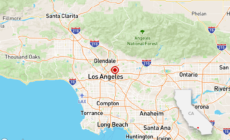-
Why Country Fans Are Furious Over The CMAs Toby Keith Tribute - 15 mins ago
-
Man Who Faked Kayaking Death Says in Video He’s ‘Safe’ - 16 mins ago
-
‘Doomsday fish’ washed ashore in California, but what does that mean? - 40 mins ago
-
On Israel, the International Criminal Court Is Wrong on the Law—and the Facts | Opinion - 50 mins ago
-
In America, if Everything Is a Public Health Crisis, Nothing Is - about 1 hour ago
-
The Mountain fire was the third most destructive wildfire in a decade. These maps show why - about 1 hour ago
-
Map Shows Most Popular Relocation Countries for Blue-State Residents - about 1 hour ago
-
Jussie Smollett’s Conviction for False Hate Crime Claim Is Overturned - 2 hours ago
-
Mom Dreamed Cat Would Meet Newborn—Touched by Reaction When It Happened - 2 hours ago
-
Nearly half of L.A.’s homeless budget went unspent, controller finds - 2 hours ago
Schiff and Garvey Advance in the California Senate Race for Feinstein’s Seat
Representative Adam Schiff, the lead prosecutor in Donald J. Trump’s first impeachment trial, and Steve Garvey, a former Major League Baseball star, advanced on Tuesday night to the California general election for a Senate seat, according to The Associated Press.
Election night returns showed that Mr. Schiff, a longtime Democratic congressman from the Los Angeles area, and Mr. Garvey, a Republican political novice, had secured two spots on the November ballot ahead of Representative Katie Porter, an Orange County Democrat who had been their closest rival.
Representative Barbara Lee, a Democrat and well-known Bay Area progressive, was in fourth place.
The November general election will determine who will replace Dianne Feinstein, who held the seat for more than three decades until her death in September.
During the campaign, Ms. Porter, 50, had accused Mr. Schiff, 63, and his supporters of engineering Mr. Garvey’s ascendance to set up an easier November election. Mr. Schiff, who had raised more than $30 million by last month, spent lavishly on statewide ads that compared Mr. Garvey to Mr. Trump, and that framed him as Mr. Schiff’s chief opponent.
“Because of you, we have the establishment running scared,” Ms. Porter told supporters at her election night party in Long Beach, Calif., adding that Mr. Schiff was “spending more to boost the Republican than promoting his own campaign
The strategy encouraged the state’s Republican voters to consolidate behind Mr. Garvey, 75, who is still recognized from his days playing for the Los Angeles Dodgers and San Diego Padres more than three decades ago. And it elevated Mr. Schiff as the leading Democrat for an electorate dominated by liberals.
The two candidates are now set up for a fall race in which the electoral math will be overwhelmingly in Mr. Schiff’s favor. Democrats have a 2-to-1 voter registration advantage in California, and the state has not elected a Republican to statewide office since Arnold Schwarzenegger was re-elected as governor in 2006.
Turnout for Tuesday’s primary was strikingly low, which placed a number of consequential decisions in the hands of an electorate that is older, whiter and generally more conservative than the state’s overall voting population. Republicans, who make up less than a quarter of California’s registered voters, had cast more than 31 percent of the ballots as the final day of primary voting began.
When the Senate race began more than a year ago, the conventional wisdom was that the general election would come down to Mr. Schiff and Ms. Porter, two well-known Democrats with formidable records in Congress and fund-raising prowess.
Mr. Schiff, a former federal prosecutor and 12-term congressman from Burbank, rose to national prominence as a ranking member and then chairman of the House Intelligence Committee. As chairman, he led the first impeachment inquiry into Mr. Trump’s efforts to solicit election assistance from Ukraine.
Ms. Porter, a former law professor who has represented southern Orange County since 2019, gained widespread recognition for her whiteboard tutorials on national issues and her blunt takedowns of powerful leaders and corporate executives during congressional hearings.
Mr. Schiff, a prodigious fund-raiser, had locked up endorsements early from most of his Democratic colleagues in California’s large House delegation, many of whom he had supported before. Among them was former Speaker Nancy Pelosi, for whom Mr. Schiff had long been a reliable lieutenant. Ms. Porter leveraged grass roots fund-raising and her popularity with younger progressives, many of whom viewed Mr. Schiff as too much of an establishment player.
Then, in October, Mr. Garvey entered the race, instantly becoming the best-known Republican in a field of some two dozen contenders. Mr. Garvey still has substantial name recognition with older Californians, and G.O.P. officials welcomed him as a name that might mobilize their voters.
Speaking to reporters at his election night party in Palm Desert, Calif., Mr. Garvey called the primary “the first game of the doubleheader,” in remarks that aired on KCRA-TV. “The second game is going to be daunting.”
“I think it should be exciting for all of you,” he added. “I mean, it’s actual competition now.”
In three televised debates, Mr. Garvey pitched himself as a unifying presence, and refused to say whether he would vote for Mr. Trump or accept his endorsement. His policy positions were vague, and he skipped most other candidate forums.
But Mr. Schiff’s ads boosted his standing in the polls, as did a $10 million ad campaign against Ms. Porter that was launched in the final days by tech billionaires and cryptocurrency interests.




















